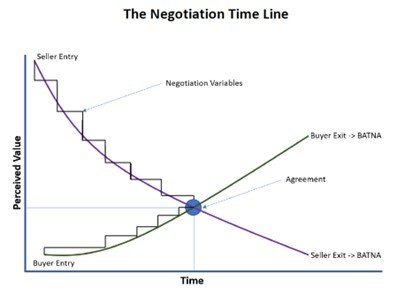How to be a Better Negotiator
How to Be a Better Negotiator
 Negotiation is often seen as a complex process, where both sides aim to achieve their best outcomes. Understanding the negotiation timeline and key concepts can help you navigate the process effectively. Below, we break down the essential elements:
Negotiation is often seen as a complex process, where both sides aim to achieve their best outcomes. Understanding the negotiation timeline and key concepts can help you navigate the process effectively. Below, we break down the essential elements:
Seller Entry and Buyer Entry
At the start of a negotiation, the seller typically has a high perceived value for their product or service, while the buyer enters with a lower perceived value, often influenced by their budget or desired price.
Changing Perceptions Over Time
As negotiations progress, perceptions on both sides shift:
- The seller may lower their price incrementally based on factors like market conditions or competition.
- The buyer's perceived value might increase as they recognise the benefits or receive concessions from the seller.
Key Negotiation Variables
Several variables influence the negotiation process, including:
- Product quality
- Delivery time
- Payment terms
- Other specific conditions
Adjustments in these areas help bring both parties closer to a middle ground.
BATNA and Points of Exit
Each party should identify their BATNA (Best Alternative to a Negotiated Agreement). If a satisfactory agreement cannot be reached:
- The buyer may exit if they believe a better alternative exists.
- The seller might walk away if the deal doesn't meet their minimum acceptable terms.
Reaching an Agreement Point
The negotiation often concludes at an agreement point where:
- The seller's reduced perceived value aligns with the buyer's increased perceived value.
- If no intersection occurs, both parties may revert to their BATNA.
Conclusion
Negotiation is a dynamic process of adjustments. By understanding the shifts in perceived value and employing the right tactics, both buyers and sellers can improve their chances of reaching a mutually beneficial agreement.
Definition: BATNA
In business talks, a BATNA is a benchmark you set before you meet the other side. It shows the best deal you can reach on your own if the talks break down. Your BATNA stays in your hands, does not depend on the other party, and marks the point where you should walk away.
Show CG4D Definition
- Set before any face-to-face talks start
- Shows the best result achievable if talks fail
- Stays under your control and does not depend on the other side
- Defines the clear walk-away line that protects value
Article Summary
Smart negotiation is simple: enter talks with a clear BATNA, watch how price and value move, trade low-cost items for high-worth ones, and agree only when both buyer and seller gain more than they could get somewhere else.
Frequently Asked Questions
Here are some questions that frequently get asked about this topic during our training sessions.
What is a BATNA in negotiation?
Why set a walk-away point before talks start?
How do buyer and seller views change during a deal?
Which factors beyond price can I trade?
When should I exit a negotiation?
How can both sides reach a win-win agreement?
Does a first price cut weaken the seller?
Thought of something that's not been answered?
Did You Know: Key Statistics
A 2024 CIPS survey of 500 UK buying teams found that those who entered talks with a written BATNA saved on average 7% more and closed deals 38% faster than teams without one. The 2025 McKinsey Global Skills Benchmark reports that companies that give staff at least eight hours of formal negotiation training enjoy a 24% rise in profit on negotiated contracts within twelve months.Blogs by Email
Do you want to receive an email whenever we post a new blog? The blogs contain article 5-10 minutes long - ideal for reading during your coffee break!
Further Reading in Assertiveness
-
How to Be a Better Negotiator
Boost your negotiation skills with clear steps on BATNA, price moves and value gains. Learn to reach win-win agreements fast and walk away smart when needed.
Read Article > -
How assertive are you?
Use assertiveness, not aggression. Get clear tips on tone, stance and words to speak up in meetings, deter bullies, handle praise and feedback, and earn respect
Read Article > -
Interpersonal communication skills training
Interpersonal communication skills training teaches feedback, active listening, delegation, persuasion and goal setting to cut conflict and lift team perform
Read Article > -
Five principles of confident communication
Discover five proven principles for confident communication. Get clear language, body and voice tips, plus a plan that boosts leadership and manager confidence.
Read Article > -
How to develop your personality
Learn how to develop an attractive personality by building vitality, compassion, productivity, honesty and humour. Follow steps to make people like, trust you.
Read Article >
Looking for Leadership and Management Training?
If you're looking to develop your Assertiveness Skills, you may find this Leadership and Management Training Course beneficial:
Open Training Course Pricing and Availability
Next Open Course Starts in 11 days, Cardiff, places available






